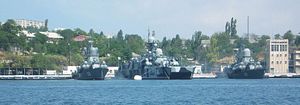Russia is planning to significantly expand its naval presence in Crimea, following Moscow’s annexation of that territory.
According to Russian media outlets, Admiral Viktor Chirkov, the commander-in-chief of Russia’s Navy, said on Tuesday that Moscow is looking to expand the country’s naval presence in Crimea in the coming years.
The Black Sea Fleet will have a network of bases on the Crimean Peninsula, including the main naval base in Sevastopol and other facilities,” Admiral Chirkov was quoted as saying. He added, “This infrastructure will be self-efficient allowing us to place comfortably warships, submarines and coastal troops [around the peninsula] with support of developed social infrastructure.”
The report went on to say that Chirkov had indicated that in addition to Sevastopol—where Russia has long maintained a naval base—the Kremlin intended to station warships in Feodosia and Donuzlav. Chirkov also reportedly said that Russia’s Navy intends to station combat aircraft near Yevpatoria and in Belbek.
Admiral Chirkov, who previously served as the commander of Russia’s Black Sea Fleet, also announced on Tuesday that the Navy aims to expand the Black Sea Fleet in the years ahead. Specifically, Chirkov said that the Black Sea Fleet would receive an additional 30 warships, submarines and auxiliary vessels over the next six years. Ria Novosti quoted Russia’s Defense Ministry as saying that this would include six Admiral Grigorovich-class frigates and six Varshavyanka-class (Improved Kilo-class) diesel-electric submarines.
“The Black Sea Fleet must have a full complement of naval vessels to be capable of performing all assigned missions,” Adm. Viktor Chirkov said, Ria Novosti reported. “This is not a provocative military buildup. This is something the Black Sea Fleet urgently needs as it has not been receiving new vessels for many years.”
Russian media outlets maintain that Russia has had a naval presence in Sevastopol since the Empress Catherine the Great founded the city as a naval base in 1783. During the Cold War it served as the headquarters of the Soviet Black Sea Fleet. Following the collapse of the Soviet Union, however, Russia and Ukraine engaged in a sometimes bitter row over how to divide the vessels comprising the Black Sea Fleet as well as over access rights to the Black Sea fleet.
Nonetheless, Russia has continued to use the Sevastopol naval base as the headquarters of the Black Sea Fleet in the post-Cold War era, even as the Ukraine navy also maintained a presence there before the recent crisis in which Crimea seceded from the rest of Ukraine.
Back in 2010, Ukraine agreed to renew Russia’s lease over the Sevastopol naval base for 25 years in exchange for discounted Russian natural gas. The deal sparked fierce opposition from the pro-Western members of Parliament in Ukraine. Debate over the deal became so heated that it at times escalated into physical confrontations between Ukrainian MPs. Ultimately, the extension of the lease was approved by a slight majority.
Russia’s decision to expand its naval infrastructure and fleet in the Crimea is likely in part an attempt to intimidate the rest of Ukraine and the greater region. At the same time, the move will also help consolidate Russian control over the disputed region, and make it more difficult for Ukraine to eventually reassume control over the area.

































